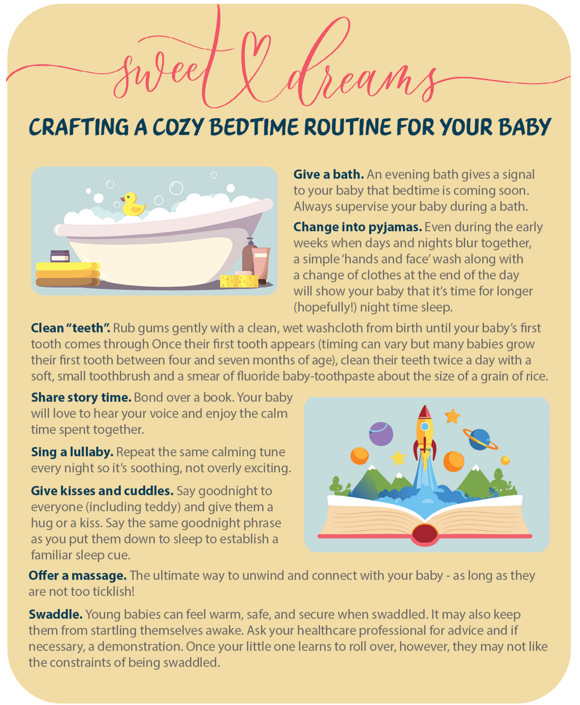
There are few sights more heartwarming than that of your blissfully sleeping baby. Establishing a consistent infant sleep routine can be a game-changer for both baby and parents. A well-structured sleep routine not only helps your little one feel secure and comfortable but also promotes better sleep patterns and longer stretches of rest. Sleep helps your baby recharge their batteries, it gives them the chance to rest the body and mind which supports their growth and development. Implementing a consistent infant sleep schedule can lead to more peaceful nights and happier days for the entire family.
How much sleep is enough?
All babies are unique, but newborns typically sleep 14-17 hours in one 24-hour day. This is usually in 20–50-minute blocks, and they may have one or more blocks at a time. By 8 to 10 months, your baby needs around 12 to 16 hours of total sleep each day, including daytime naps and night-time sleep. Your baby will probably sleep between 9 and 12 hours a night and napping 2-3 times during the day, for varying amounts of time. If you’re lucky, they may be sleeping through the night now, which means you feel more rested too.
Some infant sleeping patterns will include a nap for 30 minutes and others for up to two hours. You may meet with some resistance from your baby at nap time. Sleep problems are common, and it may be that your baby simply does not want to be away from you, rather than that they aren’t tired.
The importance of an infant sleep routine
Establishing a bedtime routine for infants may just be what you need to help your little one get to sleep and stay asleep. Perhaps the sleep routine in your house starts at 5pm and includes a bath, a story or lullaby, and a kiss goodnight. Whatever you have become used to doing should be part of each night’s pre-sleep pattern.
Setting up an infant sleep schedule early on, helps your little one know what to expect when it’s time to sleep. Knowing what to expect will help your baby to get comfortable and relaxed, setting the scene for a good sleep. Setting up a sleep routine from birth will make things much easier for when they get older and start exerting some of that independence we want, and dread at the same time. By the time your baby is a toddler, they will be so familiar with their bedtime routine that they choose the story or lullaby they prefer!
Bedtime routine for infant's checklist
Choose your favourite calming techniques from this list to show your baby it's time for sleep. The order doesn't matter, as long as you stick to a similar pattern every night, so your little one knows what to expect.

10 tips on setting up a bedtime routine for infants to help them sleep through the night
Having a bedtime routine for your infant can help them settle down more easily and lets them know that it’s time for bed long before they are put down in their cot. Pick and choose your favourite tips and use them in the order that works for you. Try and keep your infants’ bedtime and sleep routine consistent to help them know what to expect.
1. Recognise your baby’s signs of tiredness
You’ll start noticing signs that your baby is tired like yawning, rubbing their eyes, grabbing their ears, crying and whining. The more you take notice of these signs, the easier it will be to read them and respond to your baby’s sleep cues.
2. Day versus night
For your baby to adjust to the outside world they’ll need to tell the difference between daytime and night-time so that they can recognise the cues for sleep time. Figure out a baby sleep routine for both daytime and night-time. Soft light and activity in the day, and dim lights, dark blinds and baths in the evening. They should know what to expect over time.
3. Quiet time
Build in a calm, quiet half hour before you start your infant’s sleep routine and include a feed if possible. It’s more difficult to settle a hungry baby! Keep loud, fun games for daytime and try not to overstimulate in the evenings. Use soft voices and make less eye contact during the nighttime, even if your little one wakes up to play.
4. Try not to tiptoe around a sleeping baby
While understanding the difference between day and night is helpful, silence in the house could turn them into a light sleeper when they go anywhere else for naps.
5. Try to get your baby used to napping out and about
Take your baby outdoors for a walk or to a café at nap time so they get used to all the noises. They have a few years of napping ahead, so it will be better if they get used to going with the flow a bit. Get a cool, breathable cover for the pram for naps on the go (a muslin cloth works well).
6. Put baby to bed drowsy
Put baby down when you notice they’re becoming sleepy, rather than fully asleep. To help your baby adjust to falling asleep in their cot, instead of your arms. If they need help falling asleep, gently give them a head or belly rub so that they know you are there.
7. Watch out for certain sleep crutches
Rocking might work now, but soon they’ll be a lot heavier and might expect it every night. Try gradually weaning them off cuddle/rocking time before a sleep-association is established. You could go from rocking to placing your baby in the cot and giving a rhythmic pat and "shhh" to sleep. Once that works, next time decrease the number of pats and "shhhs". Eventually you will be able to put your baby down to go sleep by themselves with this gradual approach. It’s a chance for your baby to learn to self-soothe without crying it out.
8. Check for other reasons for waking in the night
For older babies that were sleeping through the night and start to wake up occasionally, check other reasons and don’t immediately offer a feed. Instead, run through possible reasons for their waking up in your mind. After checking the obvious need for a nappy change, or being too hot/cold, ask yourself if they are T.I.R.E.D:
T – Teething?
I – Ill (Does your child have a cold? Or have they just had vaccinations?)
R – Routine disrupted (Has their usual bedtime routine changed?)
E – Extraordinary (Is something different tonight? Are you on vacation? Have you just moved to a new house?)
D – Dreams (Have they had a bad dream?)
If you suspect teething is the culprit, try using a cold washcloth on gums to soothe them. If you think they woke up due to one of these other reasons, soothe and reassure your little one. Always consult your healthcare professional if your baby is showing any signs of illness.
9. Share the load
Consider how to share feeds with your partner or ask a friend or relative for help so it’s not always you getting up in the night. If you’re breastfeeding, read our article on expressing breast milk which may help.
10. Consistency
Remember the secret to a good routine is consistency, not perfection. For example, feed, bath, book, and bed in the same order each night. Some nights might be easier than others, especially with younger babies. Consider incorporating a bedtime routine around 20 minutes before you want your baby to be asleep.
All of these habits help your little one sleep through the night. Understand that every baby is different and what works for some may not work for others. Talk to your healthcare professional if you need help. Remember you can only do so much.
Figuring out how much sleep your baby needs depending on their age and development stage is difficult. Luckily we have a great guide of what to expect! Find out how much sleep your newborn baby needs.
Frequently asked questions about infant sleep routines
What can help my child sleep?
Setting up a calming feed-sleep-play routine, and recognising and acting on your little one’s tired cues early will help your them settle and sleep. Tired cues may include the obvious such as yawning and drifting eyes, to the less obvious such as general fussiness. When you recognise your child’s tired signs, make sure they have a clean nappy and settle them in a calm and comfortable environment.
At what age should my baby have a sleep routine?
An infant sleep routine is a great idea to start introducing at around the age of 4 to 6 weeks. At this stage, your baby will begin to develop more regular sleep patterns, and a consistent infant bedtime routine can help them feel secure and ready for sleep. By establishing a bedtime routine for infants early on, you can create positive sleep associations that will benefit both you and your little one as they grow.
What is the ideal baby sleep routine?
An ideal infant sleep routine is all about creating a calming environment and consistent practices that signal it’s time for sleep. Every child is different, so it’s important to work out a sleep routine that works for you and your little one. This could involve dimming the lights, giving your baby a warm bath, reading a short story, or singing a lullaby. Aim for an infant sleeping pattern that lasts around 20 to 30 minutes, and try to keep the same order of activities each night. The key is to make it soothing and predictable, so your baby knows what to expect and can relax into their sleep routine more easily.
When to stop giving milk before bed?
A lot of babies find the evening milk feed very relaxing and is commonly part of a bedtime routine for infants. Stopping this milk feed before bed will be an individual decision based on you and your child’s needs and readiness. But generally, you can start to think about stopping this milk feed before bed after they turn one. At this point, they will start to receive most of their nutrition from solid foods and can drink water instead. It’s important to pay attention to your baby’s cues and consult with your healthcare professional if you have any concerns.
Sources:
- Raising Children’s Website. Accessed at Baby & newborn sleep routines: a guide | Raising Children Network



